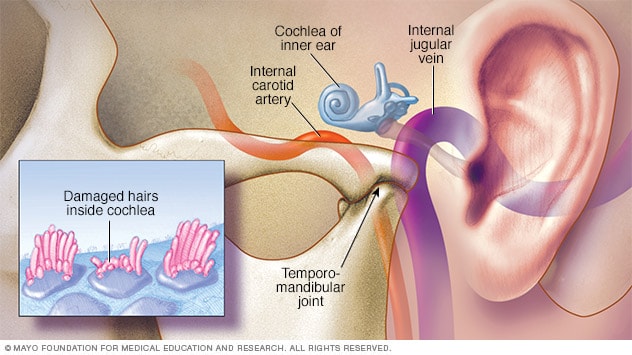- 24 X 7 Online Support [email protected]
- Contact Us +91 7520435375
- Emergency Number 0591-2411334
.jpg)
Overview

Tinnitus is when you experience ringing or other noises in one or both of your ears. The noise you hear when you have tinnitus isn't caused by an external sound, and other people usually can't hear it. Tinnitus is a common problem. It affects about 15% to 20% of people, and is especially common in older adults.
Symptoms
Tinnitus is most often described as a ringing in the ears, even though no external sound is present. However, tinnitus can also cause other types of phantom noises in your ears, including:
- Buzzing
- Roaring
- Clicking
- Hissing
- Humming
Most people who have tinnitus have subjective tinnitus, or tinnitus that only you can hear. The noises of tinnitus may vary in pitch from a low roar to a high squeal, and you may hear it in one or both ears. In some cases, the sound can be so loud it interferes with your ability to concentrate or hear external sound. Tinnitus may be present all the time, or it may come and go.
In rare cases, tinnitus can occur as a rhythmic pulsing or whooshing sound, often in time with your heartbeat. This is called pulsatile tinnitus. If you have pulsatile tinnitus, your doctor may be able to hear your tinnitus when he or she does an examination (objective tinnitus).
When to see a doctor
Some people aren't very bothered by tinnitus. For other people, tinnitus disrupts their daily lives. If you have tinnitus that bothers you, see your doctor.
Make an appointment to see your doctor if:
- You develop tinnitus after an upper respiratory infection, such as a cold, and your tinnitus doesn't improve within a week.
See your doctor as soon as possible if:
- You have hearing loss or dizziness with the tinnitus.
- You are experiencing anxiety or depression as a result of your tinnitus.
अवलोकन
कान के अंदर और क्षतिग्रस्त बाल
टिनिटस तब होता है जब आप अपने एक या दोनों कानों में बजने या अन्य शोर का अनुभव करते हैं। टिनिटस होने पर आप जो शोर सुनते हैं वह बाहरी ध्वनि के कारण नहीं होता है, और अन्य लोग आमतौर पर इसे नहीं सुन सकते हैं। टिनिटस एक आम समस्या है। यह लगभग 15% से 20% लोगों को प्रभावित करता है, और विशेष रूप से वृद्ध वयस्कों में आम है।
लक्षण
टिनिटस को अक्सर कानों में बजने के रूप में वर्णित किया जाता है, भले ही कोई बाहरी ध्वनि मौजूद न हो। हालाँकि, टिनिटस आपके कानों में अन्य प्रकार के प्रेत शोर भी पैदा कर सकता है, जिनमें शामिल हैं:
गूंज
गर्जन
क्लिक करना
ताली बजाते रहेंगे
गिनगिनानेवाला
टिनिटस वाले अधिकांश लोगों में व्यक्तिपरक टिनिटस या टिनिटस होता है जिसे केवल आप ही सुन सकते हैं। टिनिटस का शोर कम गर्जना से लेकर उच्च चीख तक की पिच में भिन्न हो सकता है, और आप इसे एक या दोनों कानों में सुन सकते हैं। कुछ मामलों में, ध्वनि इतनी तेज हो सकती है कि यह बाहरी ध्वनि को ध्यान केंद्रित करने या सुनने की आपकी क्षमता में हस्तक्षेप करती है। टिनिटस हर समय मौजूद हो सकता है, या यह आ और जा सकता है।
दुर्लभ मामलों में, टिनिटस एक लयबद्ध स्पंदन या जोशिंग ध्वनि के रूप में हो सकता है, अक्सर आपके दिल की धड़कन के साथ। इसे पल्सेटाइल टिनिटस कहा जाता है। यदि आपके पास स्पंदनात्मक टिनिटस है, तो आपका डॉक्टर आपके टिनिटस को सुन सकता है जब वह एक परीक्षा (ऑब्जेक्टिव टिनिटस) करता है।
डॉक्टर को कब दिखाना है
कुछ लोग टिनिटस से बहुत परेशान नहीं होते हैं। अन्य लोगों के लिए, टिनिटस उनके दैनिक जीवन को बाधित करता है। यदि आपके पास टिनिटस है जो आपको परेशान करता है, तो अपने डॉक्टर को देखें।
अपने डॉक्टर को देखने के लिए अपॉइंटमेंट लें यदि:
सर्दी जैसे ऊपरी श्वसन संक्रमण के बाद आप टिनिटस विकसित करते हैं, और आपके टिनिटस में एक सप्ताह के भीतर सुधार नहीं होता है।
जितनी जल्दी हो सके अपने डॉक्टर से मिलें यदि:
आपको टिनिटस के साथ सुनवाई हानि या चक्कर आना है।
आप अपने टिनिटस के परिणामस्वरूप चिंता या अवसाद का अनुभव कर रहे हैं।



